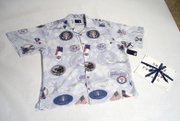Cult Industries USA on Pause
Australian surf brand Cult Industries has temporarily ceased operations at its Huntington Beach, Calif.–based American headquarters.
The company, which launched in 2001 and landed stateside in 2004, sold its surf apparel for men and women, sunglasses, jewelry, accessories, swimwear, wetsuits, surfboards, and snow gear at core and specialty retailers across the nation. At its peak, Cult Industries sold its goods at 187 doors in the United States, including Nordstrom, Macy’s and Urban Outfitters. The brand’s American distributor, Cult Industries USA LLC, which handled sales and distribution for Cult under a distribution agreement, employed seven individuals. Doug Spong, owner and founder of the Australian brand, is a partial owner of Cult Industries USA, but the American distributor is independent from the Australian company. In 2006, Cult Industries USA opened a shop in Huntington Beach and stocked it with more than 700 Cult products.
Now, Cult Industries USA has laid off its staff, vacated its offices and will stop distributing goods to retailers in the United States while Spong and the company decide how to move forward, Spong confirmed. The Huntington Beach retail store, which is one of 25 worldwide, will remain open and will, for now, be the sole source of Cult Industries product in the United States. In March, Cult Industries USA’s brand manager and part owner, Gary Richards, left the company, according to Steve Barrett, chief executive officer of Cult Industries Australia.
Spong said Cult Industries is looking to divest its direct interests in the United States. “We are having a philosophical change in how we approach America,” Spong said, adding that in the future Cult Industries will steer clear of distribution agreements here.
For now, Spong said the company is in talks with several potential American licensees who would manage the brand going forward. Another possibility is a partnership that would allow Cult to roll out more stores in the United States, he added. “We believe any form of remote management from Australia should be unnecessary from here on,” he said.
Repositioning its American business will have no effect on Cult Industries’ Australian or overseas business, Spong said. Cult Industries, which distributes its goods in 39 other countries, also stumbled in a few other territories this year, according to Spong. “Two or three failed to grow this year. South American territories are hard for us, and remote management is not catered for in our global structure.”
Executives at Cult Industries Australia are planning a big announcement on their new American structure in September, according to Barrett and Spong.
Surf Indy Sees Billion-Dollar Growth
The Surf Industry Manufacturers Association has released more figures from its 2006 Retail Distribution Study. The study, commissioned by SIMA, shows a leap in growth for the surf industry. According to the study, the surf industry has grown nearly a billion dollars since 2004, up 14.5 percent to $7.48 billion in 2006 from $6.52 billion.
The popularity of the surf lifestyle, the industry’s adeptness at tapping into women’s purchasing power, brand diversification and the industry’s loyalty to its core distribution channels are all contributing factors to the surf industry’s growth, the study found.
Keeping “core” is a big theme in the surf industry, and now it seems it is also a sound financial strategy. “The minute a brand is in secondary retail distribution channels, its cool factor and authentic reason to exist is challenged,” said Dick Baker, SIMA’s president, in a statement. “Maintaining authenticity to core surf customers by distributing through surf and skate shops is what’s helping to keep surf brands cool and relevant.”
The actual number of surf retailers in the country has grown as well, up from 4,741 in 2004 to 5,048 in 2006. Core retailers’ sales totaled $5.51 billion on their own in 2006, up more than 13 percent from 2004.
Still, some of the industry’s quintessential brands, including Hurley, Roxy and Quiksilver, are sold at major department stores, and core brands often position their juniors or young contemporary offerings to appeal to boutiques and trendy specialty stores. On its own, women’s apparel sales have spiked to $327 million in 2006, up from $249 million in 2004.
One area that holds lots potential growth is Internet sales. According to the study, in 2006, core retailers that sold goods online attributed nearly a quarter of their sales to e-commerce.
SIMA’s retail study also included figures for the skate industry, which grew an estimated 6.5 percent since 2004. The skate industry remains a male-dominated retail arena, with its top sales generators being shoes, equipment and men’s apparel. Threequarters of all skate apparel sales are earned by men’s and boys’ apparel. Men’s apparel alone totaled $561.7 million in sales in 2006.
Happy Birthday, Surfer President
Who knew President George W. Bush is a beach bum at heart?
In June, the White House’s Senior Gift Officer from the Office of the Chief of Protocol called up Newport Beach, Calif.–based surf brand Toes on the Nose and requested a custom-designed Hawaiian-style shirt for Bush’s 61st birthday in July. The one-of-a-kind shirt, designed by Toes on the Nose designer Reed Robinson, features a few of the president’s favorite things, including: puzzle pieces; his pet dog, Barney; the Presidential Seal; Air Force One; an iPod; the Yale logo; and the Texas flag. Bush’s initials were embroidered on the sleeve, and “President Bush” is printed on the tag to prevent it from landing on anyone else’s bunk at Camp David.
The shirt was produced in six days and presented to the president on his birthday, July 6. “The first reaction was that this must be some sort of July 4th prank,” said Toes on the Nose President Richard Allred. No word on whether Bush will wear his new shirt on official business.






















